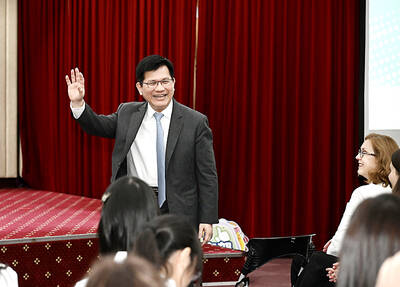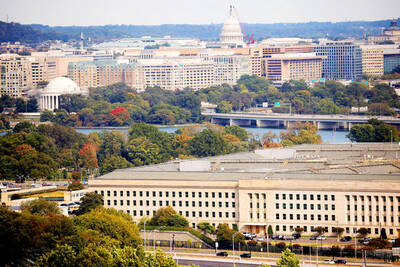Indonesian police found traces of the explosives used in the suicide bombing of the Australian Embassy inside a room rented by the two alleged masterminds of the attack, the national police chief said yesterday.
Police also released chilling security camera footage showing the small white delivery truck driving past the heavily fortified mission in Jakarta moments before it exploded, killing nine people and wounding more than 170. Police believe two of the dead were suicide bombers.
All those killed were believed to be Indonesians, some of them embassy guards.
The bombing, which came ahead of elections in both Indonesia and Australia, has been blamed on the al-Qaeda-linked Jemaah Islamiyah terror group, the same network implicated in the October 2002 Bali nightclub blasts and last year's attack on the JW Marriott Hotel in Jakarta.
Also yesterday, 1,000 members of the radical Islamic group Hizbut Thahrir rallied in a central Jakarta square to protest terrorism. Last year the group organized protests against the US-led invasion of Iraq.
The demonstrators carried banners reading: "Islam rejects terrorism!"
"We are deeply saddened by Thursday's bombing. We don't want to be labeled as a group that supports bombings," the group's spokesman, Ismail Yusanto, told reporters.
Police have said two Malaysians, Azahari bin Husin and Noordin Top, constructed the bomb used in Thursday's blast and recruited the militants who carried out the operation.
Indonesian police chief General Dai Bachtiar said officers had found traces of TNT and sulfur in a rented room used by the pair in west Jakarta, near the city's international airport.
He said the same substances were found at the scene of the bombing.
"We are still facing a terrorist threat, especially from Azahari and Noordin Top," Bachtiar said. "We are hunting them down."
He said police believed the two men had been planning to attack an anti-terror training center during an opening ceremony in July attended by President Megawati Sukarnoputri and Australian Justice Minister Chris Ellison.
"I think they just canceled the attack ... maybe they thought security was very tight," Bachtiar said.
The information about the planned attack came from interrogation of several alleged militants arrested on Java in June, he said.
Australian Federal Police Commissioner Mick Keelty said a second group of suicide bombers may be at large in Jakarta, and that they could be planning another attack.
"Intelligence comes through all the time about threats and possible threats, and there's further intelligence in the last 24 to 48 hours of a second group," Keelty said before returning to Australia late Friday from Jakarta.
The footage released by police yesterday was taken from security cameras on two buildings opposite the mission. It shows passers-by and security guards milling outside the gate before a huge cloud of white smoke and debris envelops them.
The timing of the bombing one month before Australia's elections has led to speculation it may have been an attempt to influence the poll.
Also See Stories:
Australia raises embassy security

FIREPOWER: On top of the torpedoes, the military would procure Kestrel II anti-tank weapons systems to replace aging license-produced M72 LAW launchers Taiwan is to receive US-made Mark 48 torpedoes and training simulators over the next three years, following delays that hampered the navy’s operational readiness, the Ministry of National Defense’s latest budget proposal showed. The navy next year would acquire four training simulator systems for the torpedoes and take receipt of 14 torpedoes in 2027 and 10 torpedoes in 2028, the ministry said in its budget for the next fiscal year. The torpedoes would almost certainly be utilized in the navy’s two upgraded Chien Lung-class submarines and the indigenously developed Hai Kun, should the attack sub successfully reach operational status. US President Donald Trump

Taiwan Semiconductor Manufacturing Co (TSMC, 台積電) is expected to start construction of its 1.4-nanometer chip manufacturing facilities at the Central Taiwan Science Park (CTSP, 中部科學園區) as early as October, the Chinese-language Liberty Times (the Taipei Times’ sister newspaper) reported yesterday, citing the park administration. TSMC acquired land for the second phase of the park’s expansion in Taichung in June. Large cement, construction and facility engineering companies in central Taiwan have reportedly been receiving bids for TSMC-related projects, the report said. Supply-chain firms estimated that the business opportunities for engineering, equipment and materials supply, and back-end packaging and testing could reach as high as

ALL QUIET: The Philippine foreign secretary told senators she would not respond to questions about whether Lin Chia-lung was in the country The Ministry of Foreign Affairs on Wednesday confirmed that a business delegation is visiting the Philippines, but declined to say whether Minister of Foreign Affairs Lin Chia-lung (林佳龍) is part of the group, as Philippine lawmakers raised questions over Lin’s reported visit. The group is being led by Deputy Minister of Agriculture Huang Chao-chin (黃昭欽), Chinese International Economic Cooperation Association (CIECA) chairman Joseph Lyu (呂桔誠) and US-Taiwan Business Council (USTBC) vice president Lotta Danielsson, the ministry said in a statement. However, sources speaking on condition of anonymity said that Lin is leading the delegation of 70 people. Filinvest New Clark City Innovation Park

DEFENSIVE EDGE: The liaison officer would work with Taiwan on drones and military applications for other civilian-developed technologies, a source said A Pentagon unit tasked with facilitating the US military’s adoption of new technology is soon to deploy officials to dozens of friendly nations, including Taiwan, the Financial Times reported yesterday. The US Department of Defense’s Defense Innovation Unit (DIU) is to send a representative to collaborate with Taiwan on drones and military applications from the semiconductor industry by the end of the year, the British daily reported, citing three sources familiar with the matter. “Drones will certainly be a focus, but they will also be looking at connecting to the broader civilian and dual-use ecosystem, including the tech sector,” one source was